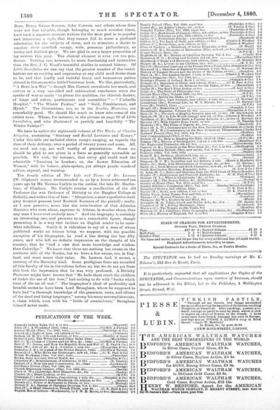The fourth edition of The Life and Times of Dr.
Lawson (W. Oliphant) comes recommended to us by a letter addressed ten years ago by Mr. Thomas Carlyle to the author, the late Dr. Macfar- lane, of Clapham. Mr. Carlyle retains a recollection of the old Professor (ho was Professor of Divinity to the Burgher College at Selkirk), and writes thus of him : "Altogether, a most superlative steel- grey Scottish peasant (and Scottish Socrates of the period); really, as I now perceive, more like the twin-brother of that Athenian Socrates who went about, supreme in Athens, in wooden shoes, than any man I have over ocularly seen." And the biography is certainly an interesting one, and presents to us a remarkable figure, though presenting it in a way that inclines an English reader to be some- what rebellious. Surely it is ridiculous to say of a man of whose published works no human being, we suppose, with the possible ,exception of his biographer, ha read a line during the last fifty years, and who left no definite impression on the thought of his oountry, that he "had a vast deal more knowledge and wisdom than Coleridge." We know that there arc nothing but swans on the northern side of the Border, but we have a few swans, too, in Eng- land, and must assert their value. Dr. Lawson bad, it seems, a memory of the Macaulay kind. Some prodigious feats are recorded of this faculty of his in the volume before us, but we do not get from this book the impression that he was very profound. A Divinity Professor might have known that "He bade them teach the children of Judah the use of the bow," had nothing to do with "books which treat of the art of war." The biographer's ideal of profundity and breadth seems to have been Lord Brougham, whom he supposed to have had "a thorough knowledge of the grammar, roots, and idioms of the dead and living languages," among his many accomplishments, a claim which, even with his "foible of omniscience," Brougham himself never made.






































 Previous page
Previous page